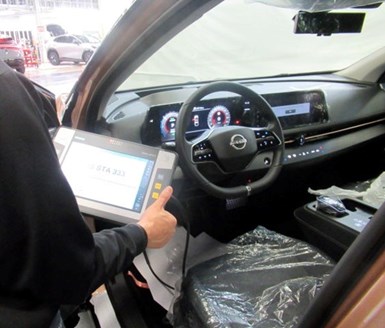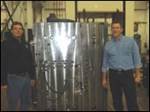Siemens, Nissan, collaborate to digitalize crossover electric vehicle production line
Cooperation draws on Siemens’ portfolio of IoT-enabled hardware, software and digital services — the open digital business platform Siemens Xcelerator — for the Nissan Ariya.

Photo Credit: Siemens, Nissan
Siemens, an automation and industrial software supplier, cooperates with Nissan to build production lines for the new all-electric crossover Nissan Ariya at the company’s plant in Tochigi, Japan. Both companies build on their long-standing cooperation. Nissan says it had already been using the Siemens Digital Industries software portfolio to optimize design and production. End-to-end digital threads enable Nissan to connect a wide variety of sources of information across product lifecycle management (PLM) platforms.
“The successful launch of the new production lines is a milestone in the collaboration of the two companies,” Cedrik Neike, member of the Managing Board of Siemens AG and CEO Digital Industries, says. “Climate change and stringent environmental regulations are powerful drivers for the development of electrified powertrains. We will bring in all of our cutting-edge technologies to this collaboration to enable a highly flexible, efficient and sustainable automotive production.”
According to Teiji Hirata, corporate vice president (VP), Vehicle Production Engineering and Development Division at Nissan Motor Co. Ltd., the Tochigi-based Nissan Intelligent Factory is building the future of mobility. “It enables us to not only improve the work environment but also to realize a zero-emission production system. To digitalize our new electric vehicle production line, we chose to work with Siemens, our innovation partner and one of the leading companies in industrial automation and digitalization, because they have the necessary expertise in this area.”
The system architecture of Nissan’s newly developed electric powertrain aims to standardize the processing and assembly of the powertrain. It includes Siemens’ safety PLC Simatic S7-1500, ET200SP-distributed I/ O module as Siemens One Single Solution (OSS). Profinet reportedly creates end-to-end communication from the field to the management level, and the engineering framework TIA Portal has also fully integrated all automation devices. This enables complete access to the entire digitalized automation process, from digital planning to integrated engineering and transparent operation.
More intelligent automobiles are said to require more and high-performing electronic control units (ECUs) in the vehicle — as is the case in the new Nissan Ariya. The Siemens diagnostic commissioning system Sidis Pro, which the company says has already been deployed in many automobile companies around the world, is implemented at Nissan’s new production line for data writing into ECU and verifying automotive electric components. Sidis Pro is a vehicle diagnosis and inspection data management system that provides optimal support for inspection processes to enable quality car production. According to Siemens, Sidis Pro manages a wide range of data with server functions, contributing to the digitization of production lines. It also enables maximum flexibility in automotive production as it is easily modifiable depends on the production plan, and the changes can be adapted quickly. The same software can be used for different applications, enabling system standardization and ensuring that fewer resources perform for more tasks even at other production sites.
Siemens continues to support Nissan in digitalizing and electrifying the production facilities and contribute to the realization of Nissan Intelligent Factory vision.
Related Content
-
MMT Chats: The Rise of Tooling Digitalization
MoldMaking Technology Editorial Director Christina Fuges chats with Bob Vancoillie with the Consumer Division of Johnson & Johnson about OEM corporate initiatives for digitizing tooling.
-
Outlook for Automation in 2024
I want to share an article I found that discusses the reasons manufacturers should adopt automation in 2024 as a strategic response to global uncertainties, reshoring requirements, labor shortages and the pursuit of increased productivity.
-
MMT Chats: Predictable Manufacturing and Incremental Gains Can Transform Moldmaking
MoldMaking Technology Editorial Director Christina Fuges catches up with the president of Eden Tool and Eden Manufacturing, Dave Tomic. We talk about predictable performance in moldmaking and the value of small incremental gains in an organization versus big change via disruptive technology. This episode is brought to you by ISCAR with New Ideas for Machining Intelligently.














